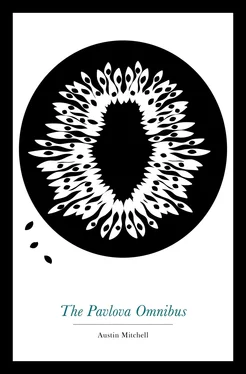Austin Mitchell - The Pavlova Omnibus
Здесь есть возможность читать онлайн «Austin Mitchell - The Pavlova Omnibus» — ознакомительный отрывок электронной книги совершенно бесплатно, а после прочтения отрывка купить полную версию. В некоторых случаях можно слушать аудио, скачать через торрент в формате fb2 и присутствует краткое содержание. Жанр: unrecognised, на английском языке. Описание произведения, (предисловие) а так же отзывы посетителей доступны на портале библиотеки ЛибКат.
- Название:The Pavlova Omnibus
- Автор:
- Жанр:
- Год:неизвестен
- ISBN:нет данных
- Рейтинг книги:5 / 5. Голосов: 1
-
Избранное:Добавить в избранное
- Отзывы:
-
Ваша оценка:
- 100
- 1
- 2
- 3
- 4
- 5
The Pavlova Omnibus: краткое содержание, описание и аннотация
Предлагаем к чтению аннотацию, описание, краткое содержание или предисловие (зависит от того, что написал сам автор книги «The Pavlova Omnibus»). Если вы не нашли необходимую информацию о книге — напишите в комментариях, мы постараемся отыскать её.
The Pavlova Omnibus — читать онлайн ознакомительный отрывок
Ниже представлен текст книги, разбитый по страницам. Система сохранения места последней прочитанной страницы, позволяет с удобством читать онлайн бесплатно книгу «The Pavlova Omnibus», без необходимости каждый раз заново искать на чём Вы остановились. Поставьте закладку, и сможете в любой момент перейти на страницу, на которой закончили чтение.
Интервал:
Закладка:

The students are another ground for staff dissatisfaction. They take the books out of the library, make the place look untidy, drive suspiciously close to the staff when homeward bound. The staff want to teach only the best but have to drop their artificial pearls in front of swine. The staff want students to be passionately interested in their subject; the students want a meal ticket and will put together any kit-set structure of Wisdom I, Taste and Discrimination II and Sense and Sensibility III which puts them as quickly as possible on to the labour market. The staff want excitement and discussion from students whose schooling has prepared them only to take down sacred texts. Say ‘Good morning’ to a class of British students and they’ll reply, ‘Good morning, Comrade’. Say it in New Zealand and they’ll take it down. The lecturer’s approach has to be to say what he’s going to say, say it, then recapitulate—a lesson brought home to me in my first lecture. With a naive enthusiasm for Socratic techniques, I outlined the case of those who thought the gentry rose from 1540-1640, then the counter case against the self-raising gentry, and invited them to choose. I was surrounded by an anxious group of students asking, ‘But what do you think?’ Here was the key to success and the line that would come back to me, with some deterioration in the grammar and style, in exam papers.

Staff see students as a necessary nuisance and a numerical argument for increased finance for their department. For university authorities the students are another problem. University officials want a quiet life, an undisturbed production flow of books, articles and graduates, and a happy local community which will hand over large sums of money because its clean, well scrubbed students are almost as big a tourist attraction as the botanical gardens. Unfortunately the raw material is volatile: girls get pregnant, students demonstrate instead of leaving it to lab assistants. Even the capping celebrations, whose real purpose is to give lawyers a week they can talk about for the rest of their lives, get embarrassing. The proper response is to turn the universities into custodial institutions, putting up the sign ‘Abandon home all ye who enter here’ and setting up halls of residence as an institutional chastity belt.
The staff are kept under control by the need to compete for scarce resources. Most departments are run on a slender secretarial staff, usually a brunette. They are understaffed and can’t finance research projects. Staff want new premises, sabbatical leave, or a trip to a conference in Australia. So all are controlled by the constant need to lobby, to propitiate and to please. University staff abandon ambitions of being good academics and concentrate on being petty lobbyists and empire builders. The best brains in the university are absorbed in a self-generating process of committee work, caucusing and canvassing. Having thus ensured a quiescent staff, Vice-Chancellors can get on with their real jobs: making speeches about the Muldoon threat to intellectual integrity, lobbying for appointment to the Broadcasting Corporation, deciding whether to refer the Capping Magazine to the Indecent Publications Tribunal, or applying for jobs overseas.
The universities should do four jobs. First, they need to expand and order the body of knowledge. They do this now, but achieve an output of only 0.8 articles per capita per year, and that mainly by taking overseas experiments and research and duplicating them in New Zealand. With a little more productivity and a bit more attention to New Zealand subjects, all would be well. Even the second job of communicating knowledge retail to the detainees is well enough done, though the aerosol approach is preferred to the hand polishing Oxford considers appropriate.
The third job is to turn out, not working models of professional men on to whom a little knowledge has been grafted without immediate rejection effects, but intellectuals, people whose thirst for knowledge is like an addiction. The universities don’t attempt this. The public image of students is of ignorant, drug crazed militants. In practice most are quietly conformist: in the years I was one of the trustees of the De Tocqueville Fund, to award an annual prize of $200 for the biggest insult to authority in any year, we never had one entrant, beyond a case of accidental pant wetting at a north Dunedin kindergarten. Students are drawn overwhelmingly from middle class backgrounds, with as few as a fifth from manual working homes, a proportion only double the contingent from overseas. Thus background insulates them from the infection of new ideas. Staff-student contact is minimal. Where it exists it is largely confined to the one department: in a survey only one in ten had had contact with staff from another department. Cross-sterilisation seems more appropriate than cross-fertilisation.
A last role—spreading knowledge out into the community—is scarcely attempted. Few are more academically snobbish and purist than the academically dull. Even the academic branch of show biz, so flourishing in Britain, does not exist. The University of Canterbury viewed my television appearances as if I was running a house of ill-fame on the side. New Zealand universities are inward-looking, preoccupied with themselves, isolated from a community which desperately needs the information, the ideas and the stimulus and diversity universities could provide. Unfortunately to do so might upset people.
Seriously though, these universities are the best in the world. Don’t ask the students, they’re biased. If you don’t believe me, ask the staff. You’ll find them either doing their gardens or Post Restante, c/o University of London.
FIFTH LETTER Fifth Letter: The Kiwi Science of Politics Sixth Letter: Sex or the New Zealand Woman’s Weekly Seventh Letter: Seven Days Shalt Thou Labour: The Games Kiwis Play Eighth Letter: The Kiwi Sniggers: A Brief Guide to New Zealand Humour Ninth Letter: The Medium is the Tedium Tenth Letter: The Kulture of the Kiwi Bird Eleventh Letter: Overseasia Twelfth Letter: Processed Pom
THE KIWI SCIENCE OF POLITICS Fifth Letter: The Kiwi Science of Politics Sixth Letter: Sex or the New Zealand Woman’s Weekly Seventh Letter: Seven Days Shalt Thou Labour: The Games Kiwis Play Eighth Letter: The Kiwi Sniggers: A Brief Guide to New Zealand Humour Ninth Letter: The Medium is the Tedium Tenth Letter: The Kulture of the Kiwi Bird Eleventh Letter: Overseasia Twelfth Letter: Processed Pom
THERE ARE SOME aspects of life in your new home I’ve hesitated to talk about. People who let their gardens get overgrown, Invercargill, bodily odours—all these had to be left until you are strong enough to bear the shock. So had politics.
In God-Zone you approach different topics with an adjustment of your volume control. With sport, shout; with sex, whisper; with politics, mutter. America’s silent majority is New Zealand’s muttering majority. If you’re afflicted by that rare perversion, a passion for politics, you’ll have to mutter more than a German with a severe Oedipus complex.
In the small amount of spare time they have left over from their main job of defending themselves against Mr Muldoon (the Genghis Khan of finance), the political scientists have been able to write numerous books and articles. By Mitchell’s Law, as the life goes out of politics it is replaced by analysis. This simple rule of taxidermy means that the duller politics become, the more frenzied and sophisticated is the attention that the burgeoning profession of political science devotes to the corpse. Voting turn-out down—analysis of elections up.
Читать дальшеИнтервал:
Закладка:
Похожие книги на «The Pavlova Omnibus»
Представляем Вашему вниманию похожие книги на «The Pavlova Omnibus» списком для выбора. Мы отобрали схожую по названию и смыслу литературу в надежде предоставить читателям больше вариантов отыскать новые, интересные, ещё непрочитанные произведения.
Обсуждение, отзывы о книге «The Pavlova Omnibus» и просто собственные мнения читателей. Оставьте ваши комментарии, напишите, что Вы думаете о произведении, его смысле или главных героях. Укажите что конкретно понравилось, а что нет, и почему Вы так считаете.












